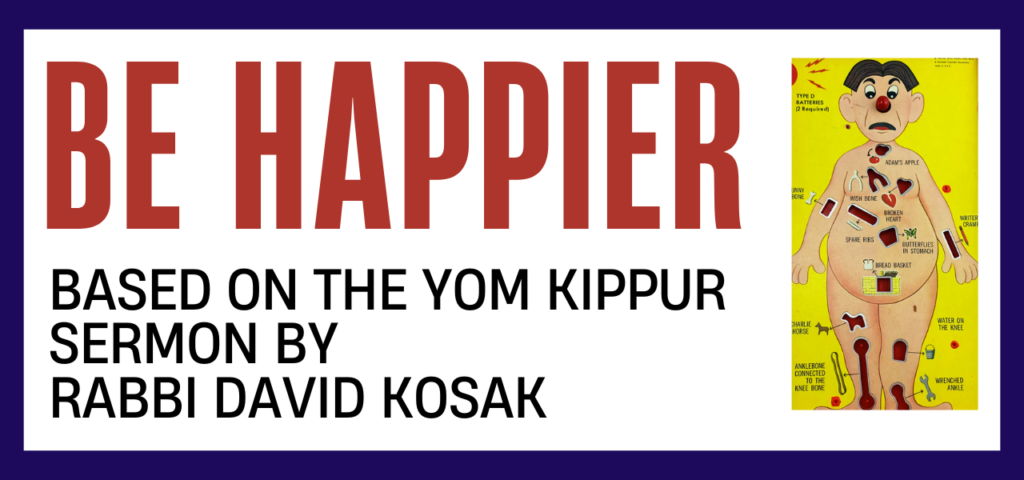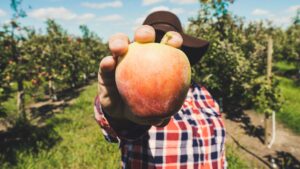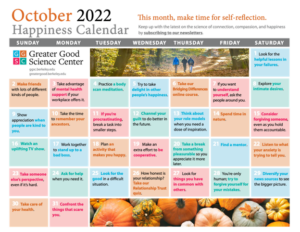Be Happier
Based on the Yom Kippur sermon by Rabbi David Kosak

Congratulations! You’ve reached Congregation Neveh Shalom’s Happier landing page. This is an ongoing work in progress. You will find some initial thoughts and links to help you develop a happiness plan and increase your happiness.
The thing with happiness is that we all have ideas and activities that work for us, so we hope that you will use this form to contribute your own thoughts. In that way, the CNS Happier page will also represent the best wisdom from our own community and beyond.
Making a Happiness Plan
The science of happiness has advanced, often confirming our instincts. To increase our happiness, there are five main buckets, or areas that we need to fill in a ritualized manner for the greatest effectiveness. We call these the Lightbulbs of Happiness because when we are taking care of these areas, our life burns brighter.
As you develop a happiness plan, please don’t try to light up all these lightbulbs at one, or you may end up feeling frustrated. Choose one area to focus most of your attention on initially. As your plan becomes habitual, you can slowly address another area.
These buckets are the:
- BODY
- HEART
- MIND
- OTHER PEOPLE
- SOUL
BODY
Eating well with proper portions, getting exercise appropriate to our capacities, sleeping, seeking medical attention, and maintaining good hygiene, as well as sufficient clothing all contribute to our happiness.
This year, develop a physical well-being plan for yourself. Each step should be simple, and take as little thought or effort as possible.

MIND
A healthy brain is a learning brain. It is so easy to slip into patterns where we are not challenging ourselves mentally or limiting our learning to what our profession demands of us. Decide on a new area of intellectual pursuits that you are less familiar with, such as history or music, and read some books or listen to podcasts on those topics.
Learning doesn’t only need to be intellectual. Picking up a new and challenging hobby can offer us similar benefits. Multnomah Arts Center is a wonderful resource for classes and ideas.
The main thing is that people actually need a healthy degree of struggle coupled with curiosity. Not pain, but struggle.
This year, develop a learning plan for yourself.

HEART
In the United Nations World Happiness Report, they speak of the low arousal emotions of happiness: feelings of calm, peace, and harmony. Those are all wonderful states of being. Yet the heart also arouses anger, jealousy, despair, fear, and countless other emotions that are not conducive to feelings of calm, peace, and harmony. The only way to achieve longer periods of calm, peace, and harmony is to feel the feels. Those emotions are part of who we are and when we can accept them rather than struggle against them, we become more at ease. The best practice the heart can undertake is to embrace radical kindness and compassion for itself. When we engage in such gentle self-concern, we find ourselves happier, and our greater joy touches those around us as well.
This year, develop a plan for yourself where you spend five or ten minutes each night before sleep reflecting on the emotions you experienced. Recognize them, honor them, then release them. At first, this may be a challenging practice, but over time we can all grow more adept at it.

OTHER PEOPLE
Focusing on others takes us out of our own suffering. When we are focused on the needs of others, there is less time to dwell on our voices of dissatisfaction. Yet that is only a partial story and one that often leads us astray. I have often met people who are so busy volunteering in an activity that doesn’t actually fulfill them, that it actually takes away from their well being. Volunteering should touch upon our own interests so that in helping others, we are also increasing our own sense of well-being.
Tal Ben Shahar, in his book, Happier, notes that “standing by one’s partner in a time of need is not a sacrifice; when we love someone we often feel that helping them is helping ourselves….Our self-interest expands to encompass our partner.” What we can’t do is sacrifice something that is essential to our own happiness, or at least aways not for any length of time.
This year, spend some time writing down which of your relationships feel reciprocal. Invest more energy in those relationships, and see how that impacts your mood.

SOUL
For our purposes here, the soul is that expansive part of us which arises during deeply involving activities or mindfulness exercises like meditation or a walk in the woods. It is the part of us that comes out to play when we are able to quiet the hostile voices of the survival brain. The soul is the seat of our love, wisdom, and compassion. When we experience a sense of deep connection or presence and are absorbed in an activity and engage with an inner state of calm, peace, or tranquility, that is the soul.
What practice or activities make you feel open, calm, joyous, or expansive? Are you engaging in those activities on a regular basis?
This year, schedule some time to engage in those practices, whether that is meditation, playing a musical instrument if that’s your thing, or taking urban hikes. The main thing is to have something regularly scheduled. Consider, for example, coming to Meditation Shabbat at CNS, which is held on the first Saturday of each month, starting in November 2022.

LINKS:
The Greater Good Science Center is housed at Berkley, and offers practical suggestions for living a better, more meaningful, and happier life. Each month they put out a Happiness Calendar. This is the link for the current month.
Each day, you can press on the colored text and it will take you to an article about the day’s happiness focus.
Click here to contribute your own thoughts. In that way, the CNS Happier page will also represent the best wisdom from our own community and beyond.




